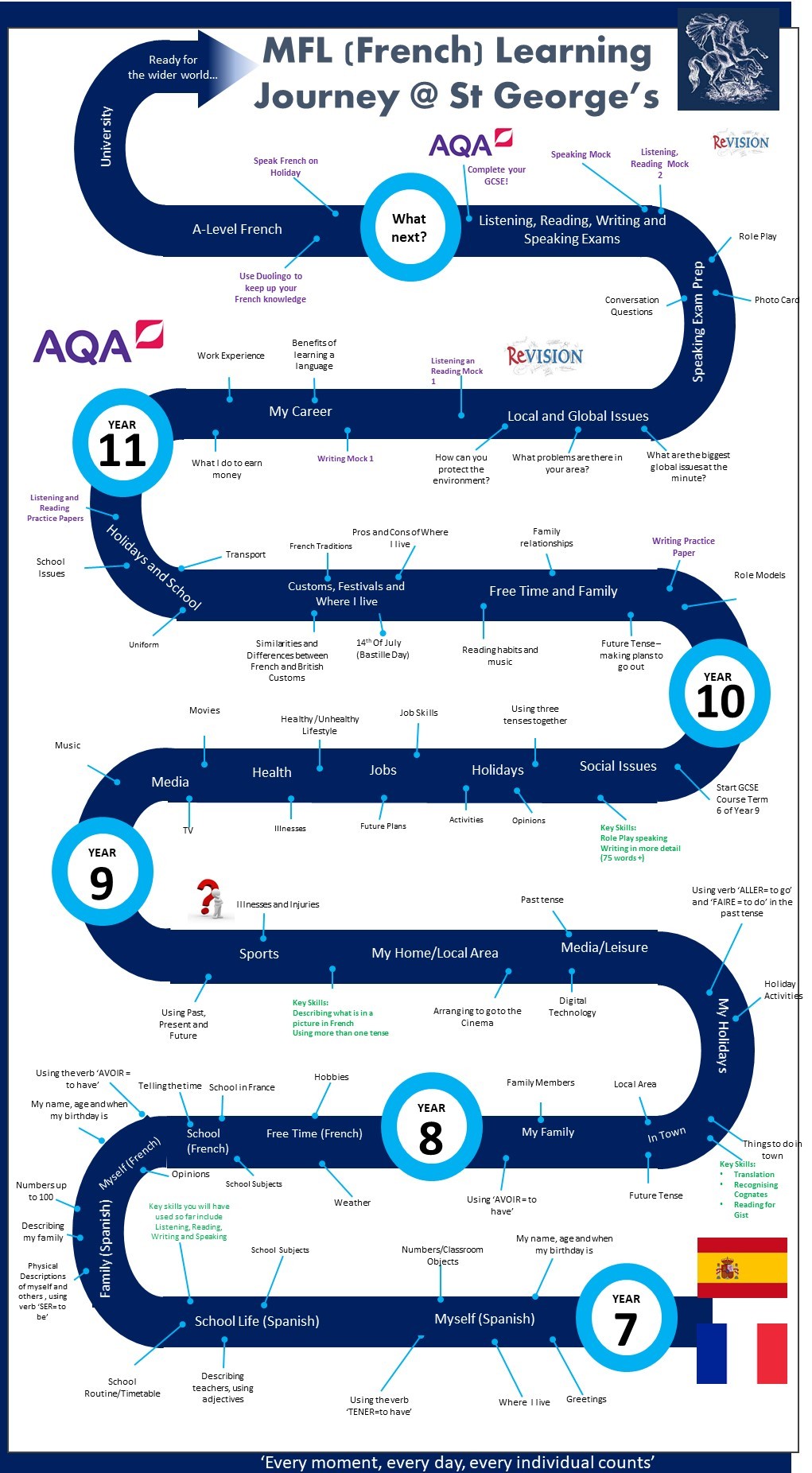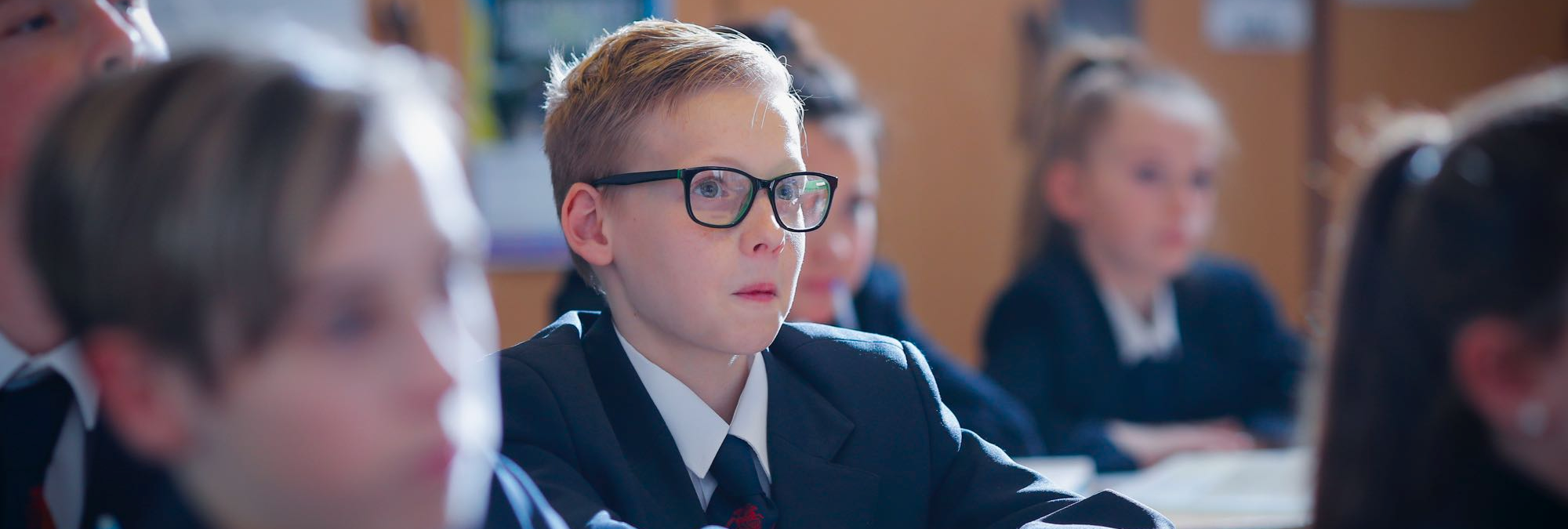French (up to GCSE)
Subject Vision
In languages at St. George’s we aim to foster an adventurous spirit by providing diverse cultural experiences and immersive language learning opportunities.
Resilience: We strive to develop resilience in our pupils, empowering them to overcome linguistic obstacles, take risks, and persevere through the ups and downs of language acquisition.
Independence: We encourage independence by nurturing self-directed learners who can confidently navigate foreign language contexts and engage in authentic communication.
Curiosity: Fuelling pupils' curiosity is at the heart of our department as we spark a passion for exploring new languages, cultures, and perspectives, inspiring a lifelong love for learning.
Challenge: We embrace challenges as transformative opportunities for growth, creating an environment where pupils are encouraged to step out of their comfort zones and push the boundaries of their linguistic abilities.
Community: Above all, we cherish our vibrant language learning community, fostering connections and collaboration amongst pupils, teachers, and native speakers of other languages to create an inclusive and supportive environment where language skills are celebrated and intercultural understanding thrives.
Staff
Our Learning Journey

HOMEWORK
| Term 1 | Term 2 | Term 3 | Term 4 | Term 5 | Term 6 | |
|---|---|---|---|---|---|---|
| Year 7 | n/a | n/a | n/a | n/a | n/a | n/a |
| Year 8 | n/a | n/a | n/a | n/a | n/a | n/a |
| Year 9 | click here | click here | click here | click here | n/a | |
| Year 10 | click here | click here | click here | click here | click here | click here |
| Year 11 | n/a | n/a | n/a | n/a | n/a | n/a |
Subject Information - KS3
All Year 7 study French in Terms 4-6, covering the following topics:
- Term 4: Talking about myself and others
- Term 5: Hobbies
- Term 6: School
Year 8
- Term 1 Media
- Term 2 Tourism
- Term 3 My Identity
- Term 4 Where I live
- Term 5 My talents
- Term 6 French Speaking world
Year 9
- Term 1 Social Media
- Term 2 Healthy Living
- Term 3 Jobs
- Term 4 Holidays
- Term 5 Social Issues
- Term 6 Revision/Begin GCSE course
GCSE Subject information - KS4
| Term 1 | Term 2 | Term 3 | Term 4 | Term 5 | Term 6 | |
|---|---|---|---|---|---|---|
| Year 10 | Family /relationships | Free time | Customs and Festivals | Where I live | Holidays |
School EOY revision |
| Year 11 | My Career | Local and Global Issues | Exam Preparation /Practice | Exam Preparation /Practice | Exam |
How the course is assessed?
The GCSE consists of 4 units: Writing 25%, Speaking 25%, Reading 25% and Listening 25%. These components are all taken at the end of this linear course.
GCSE French - Course Information
GCSE Revision Information - KS4
| General Information (Useful Information for Parents) |
|---|
|
All MFL students have bought or been loaned a Pearson MFL GCSE 9-1 Revision Guide, this contains everything they need to know and be able to do for their exams. In addition to these, below are a number of useful websites that can be accessed by students for further revision help. There is also a wealth of French speaking resources on the Student Shared area on Sharepoint. GCSE French has a Foundation Tier (grades 1–5) and a Higher Tier (grades 4–9). Students must take all four question papers at the same tier. All question papers must be taken in the same series. We follow the AQA syllabus. The papers assess the following three themes, divided into sub-topics. THEME 1: IDENTITY AND CULTURETopic 1: Me, my family and friends
Topic 2: Technology in everyday life
Topic 3: Free-time activities
Topic 4: Customs and festivals in French-speaking countries/communitiesTHEME 2: LOCAL, NATIONAL, INTERNATIONAL AND GLOBAL AREAS OF INTERESTTopic 1: Home, town, neighbourhood and regionTopic 2: Social issues
Topic 3: Global issues
Topic 4: Travel and tourismTHEME 3: CURRENT AND FUTURE STUDY AND EMPLOYMENTTopic 1: My studiesTopic 2: Life at school/collegeTopic 3: Education post-16Topic 4: Jobs, career choices and ambitionsUseful revision websites -BBC Education - www.bbc.com/education/subjects/z9dqxnb www.vocabexpress.com - App available on Apple App Store/Google Play Store |
| Personal Learning Checklist = Paper 1 | Personal Learning Checklist = Paper 2 |
|---|---|
|
Listening – Revision topics can be found in General Information Section What's assessedUnderstanding and responding to different types of spoken language How it's assessed
(Each exam includes 5 minutes’ reading time of the question paper before the listening stimulus is played.) Please practice the following types of question using revision guide and BBC Bitesize. QuestionsFoundation Tier and Higher Tier
|
Speaking - Revision topics can be found in General Information Section What's assessedCommunicating and interacting effectively in speech for a variety of purposes How it's assessed
Please practice the following types of tasks using the questions you have prepared in class and using your revision guide.
|
| Example Exam Questions/Model Answers = Paper 1 | Example Exam Questions/Model Answers = Paper 2 |
|
Example listening questions can be found in the ‘test area’ of BBC Bitesize GCSE French. |
| Personal Learning Checklist = Paper 3 | Personal Learning Checklist = Paper 4 |
|---|---|
|
Reading - Revision topics can be found in General Information Section What's assessedUnderstanding and responding to different types of written language How it's assessed
Please practice the following types of tasks using the practice paper below and using your revision guide. QuestionsFoundation Tier and Higher Tier Section A – questions in English, to be answered in English or non-verbally Section B – questions in French, to be answered in French or non-verbally Section C – translation from French into English (a minimum of 35 words for Foundation Tier and 50 words for Higher Tier) |
Writing - Revision topics can be found in General Information Section What's assessedCommunicating effectively in writing for a variety of purposes How it's assessed
Please practice the following types of tasks using the practice paper below and using your revision guide. QuestionsFoundation Tier Question 1 – message (student produces four sentences in response to a photo) – 8 marks Question 2 – short passage (student writes a piece of continuous text in response to four brief bullet points, approximately 40 words in total) – 16 marks Question 3 – translation from English into French (minimum 35 words) – 10 marks Question 4 – structured writing task (student responds to four compulsory detailed bullet points, producing approximately 90 words in total) – there is a choice from two questions – 16 marks Higher Tier Question 1 – structured writing task (student responds to four compulsory detailed bullet points, producing approximately 90 words in total) – there is a choice from two questions – 16 marks Question 2 – open-ended writing task (student responds to two compulsory detailed bullet points, producing approximately 150 words in total) – there is a choice from two questions – 32 marks Question 3 – translation from English into French (minimum 50 words) – 12 marks |
| Example Exam Questions/Model Answers = Paper 3 | Example Exam Questions/Model Answers = Paper 4 |
|
Example reading questions are in this specimen paper. |
Example writing questions are in this specimen paper. |
Revision Materials/Sharepoint
Pink revision guide, BBC Bitesize.
Job Opportunities / Careers
To learn a foreign language is to see the world anew. You are as many people as the languages you speak. The business world is in need of people who are multi-lingual because of the global economy. You will be an asset to any business with more than one language at your disposal. In today’s global economy such opportunities are constantly expanding.
Pearson Education and Skills Survey 2019, Education and Learning for the Modern World shows the major European languages most commonly in demand among businesses are Spanish (35%) and French (32%).
People who can speak another language earn on average 20% more than people who do not.
Some of the occupations involving languages are…
- Computer programmer
- Customer support adviser
- Executive search consultant
- Cultural briefing consultant
- Interpreter
- Teacher
- Language trainer
- Translator
- Engineering
- Banking
- Civil service
- Travel and tourism
- Secretary/PA
- Marketing
- Public relations
- Pharmaceutical work
- Journalism and media
- Transport and distribution
- Website localiser



